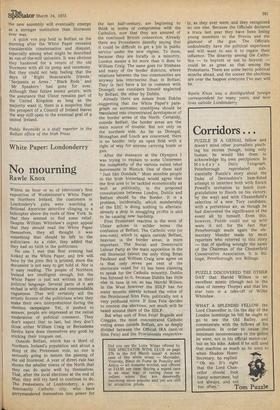White Paper: Londonderry
No mourning
Rawle Knox
Within an hour or so of television's first exposition of Westminster's White Paper on Northern Ireland, the customers in Londondery's pubs were watching a fictional American, detective clinging to a helicopter above the roofs of New York. In that they seemed to find some relief. Despite William Whitelaw's urgent appeal that they should read the White Paper themselves, they all thought it was something that should be left to the Politicians. As a rider, they added that they had no faith in the politicians.
No one I met that first evening had looked at the White Paper, and feWr will have by the Sime this is printed, since the document is not easy to get hold of. Nor is it easy reading. The people of Northern Ireland are intelligent enough, but the White Paper is just not written in their political language. Several parts of it are etched in with deliberate and commendable vagueness. That will certainly aid the artistic licence of the politicians when they make their own interpretations during the election campaigns. Yet, if pushed to answer, people are impressed at the initial moderation of political comment. They don't expect that to last, but they don't think either William Craig or Bernadette Devlin have done themselves any good by sticking their tongues out.
Outside Belfast, which has a third of Northern Ireland's population and about a third of the Protestant vote, no one is seriously going to mourn the passing of the old Stormont. A year of direct rule has Shown the srnaller towns of the North that they can do quite well by themselves. That, after the local elections at the end of May, they will try hard to continue to do. The Protestants of Londonderry, a predominantly Catholic city, who have gerrymandered themselves into power for the last half-century, are beginning to think in terms of compromise with the Catholics, now that they are assured of the continued British connection. Already there are Protestants dazedly saying that it could be difficult to get a job in public service under the new regime. To them, because they are locally in a minority, London means a lot more than it does to William Craig. The same goes for Strabane and many of the border districts, where relations between the two communities are anyway less internecine than in Belfast.
They in fact have a lot in common with Donegal; one considers himself neglected by Belfast, the other by Dublin.
Already there are noises from Dublin .suggesting that the White Paper's paragraph on economic conditions should be translated into concentrated development of the border areas of the North. Certainly, outside Belfast, the border areas are the main source of trouble. But not only on the northern side. As far as Donegal, Monaghan and Louth are concerned, there is no border, only an open field with a right of way for anyone carrying bomb or gun.
After the massacre at the Olympics I was trying to explain to some Ulstermen the complexity of the various exiled rebel movements in Munich. One of them said "Just like Dundalk." Most sensible people in the Irish hinterland would agree that the first area to be tackled economically as well as politically, in the proposed consultations between London, Dublin and Belfast should 'be the Border. It is a problem, incidentally, which membership of the EEC is doing nothing to alleviate. already a drop in smuggling profits is said to be causing new hardship.
First Protestant reaction in the west of Ulster echoes in milder terms the confusion of Belfast. The Catholic vote (or non-vote), which is, again outside Belfast, heaviest in the border areas, is more important. The Social and Democratic Labour Party as the main opposition in the old Stormont (about the only thing Brian Faulkner and William Craig now agree on is that only seven per cent of the electorate voted for it) has been claiming to speak for the Catholic minority. Dublin has listened to it, because Dublin has little else to tune in on; so has Harold Wilson.
In the West however the SDLP has for many months merely echoed the voice of the Provisional Sinn Fein, politically not a very profound voice. If Sinn Fein decides to contest the elections, not much will be heard around there of the SDLP.
But what sort of Sinn Fein? Bogside and Creggan, the most concentrated Catholic voting areas outside Belfast, are as deeply divided between the Official IRA (and/or Sinn Fein) and the Provisionals respective ly, as they ever were; and they recognised no one else. Because the Officials declared a truce last year they have been losing young members to the Provos and the glamour of the gun. The Officials undoubtedly have the political experience and will want to use it to regain their influence. The disarray among the Catholics — to boycott or not to boycott — could be as great as that among the Protestants. There are some hectic political months ahead, and the sooner the elections are over the happier everyone I've met will be.
Bowie Knox was a distinguished foreign correspondent for many years, and now lives outside Londonderry


































 Previous page
Previous page